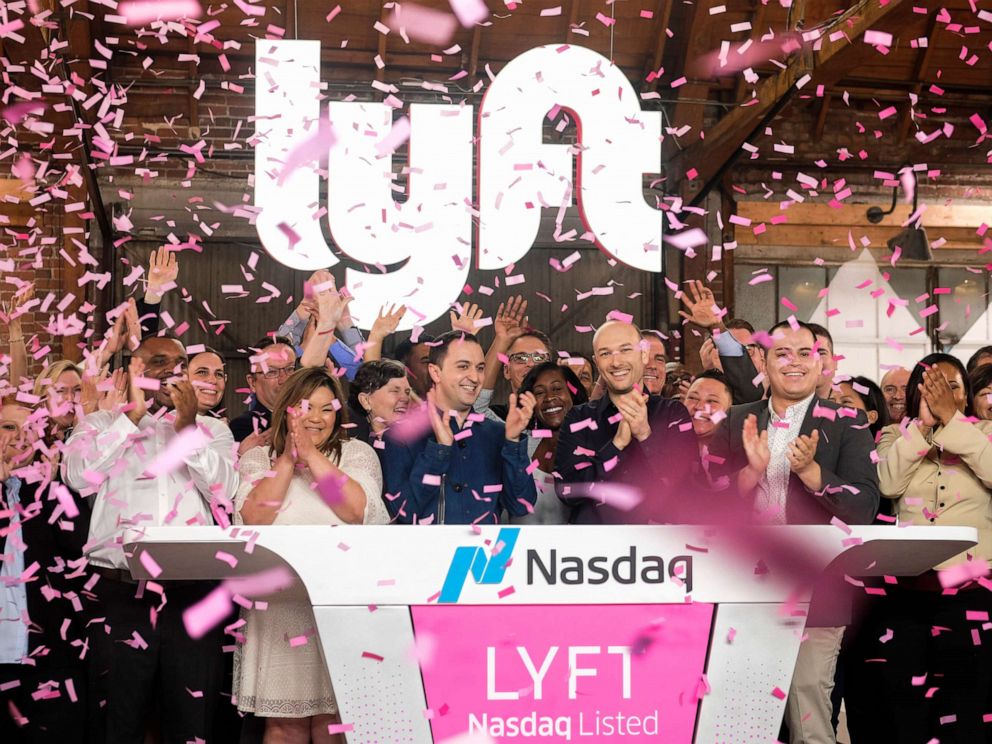As Lyft goes public with a $24 billion valuation, some drivers feel left behind
Ride-share drivers met with the California governor to advance drivers' rights.
While the founders of Lyft celebrated their company’s debut as a publicly traded company valued at $24 billion on Friday, a majority of their drivers’ paychecks are on the far side of the billionaire experience.
As company co-founders Logan Green and John Zimmer rang in the good news of their NASDAQ listing amid Lyft-signature pink confetti, representatives of the ride share drivers union met with California Governor Gavin Newsom's office.
"These investors of Lyft are making hundreds of millions and billions in the IPO while millions of drivers are trying to make rent. In this new economy, there cannot be innovation without labor standards. Hundreds shouldn’t be allowed to become billionaires while some drivers are homeless like myself," Sinakhone Keodara, a Lyft driver and Rideshare Drivers United organizer told ABC News.
Uber, whose drivers are also in the rideshare drivers' union, recently reduced the per-mile pay in Los Angeles and part of Orange County by 25 percent, or cutting per-mile fares from 80 cents to 60 cents. In September, the company raised driver per-mile rates from 80 to 60 cents.
Lyft has not officially made the same rate changes, but the promotions, drivers said, cut into their take-home pay.
"I used to drive 14-hour days, seven days a week and my pay fluctuates from $900 to $1,200 per week but most times it's on the $900 or $1,000 level," Keodara wrote in an email ahead of the Sacramento meeting, adding that his wages don't cover the cost of his expenses, including car rental and gas.
A representative for Newsom did not respond to a request for comment.
Uber did not immediately respond to a request for comment about the meeting with Newsom.
Keodara said that his wages don't cover the cost of his expenses, including car rental and gas.
"I am trapped in an endless neo-indentured servitude so to speak. I switch between sleeping in my car and paying $25 to sleep at a Korean Spa in Koreatown in Los Angeles. Some nights I don't have enough and, like many drivers, I would have to sleep in my car," he wrote.

The protests of drivers stands in contrast to the promise of participation in the IPOs for some of the most senior or most active drivers for both ride share companies, a maneuver first reported by The Wall Street Journal.
In Lyft's filing with the Securities and Exchange Commission (SEC) ahead of its IPO, the company outlined a plan for $1,000 to $10,000 bonuses for drivers who met criteria and had driven upwards of 10,000 rides or served on the company's Driver Advisory Council that could be used to by shares at an IPO price.
Lyft did not respond immediately to a request for comment about how many drivers were eligible for the bonuses and about the shares outlined in the SEC filing or about the meeting with Newsom.
"Our meeting with Gov. Newsom's office is to demand that he supports and champions our Drivers' Bill of Rights that was voted on by 3,000 of our members," Keodara wrote, adding the representatives were invited before their Monday strike action.
Lyft and Uber, which scheduled to go public in the next few months, are dependent on their existing model of using drivers as independent contractors -- and not employees. As the ride share companies grow, and recruit a larger worker pool, they've drawn increased scrutiny for their labor practices.
The drivers' union also want more transparency for both drivers and riders, including drivers' ability to see an their estimated fare and the trip destination before accepting a trip, and for riders to see an itemized breakdown with the company's commissions on passengers' receipts.
After the drivers' strike on Monday, Uber told ABC News in a statement: “Drivers told us that they value promotion opportunities, so we’re introducing a new Quest promotion feature, while also changing the per minute, per mile and minimum fare rates. These changes will make rates comparable to where they were in September, while giving drivers more control over how they earn by allowing them to build a model that fits their schedule best.”
The Quest program is a rewards program for drivers that Uber implement on Mar. 11 with the net effect of bringing the rates back to what drivers made in September.
Both Uber and Lyft have been blanketing customers with promotional offers of discounts on rides for weeks or weekends almost weekly in the run up to the companies' IPOs, which has been cutting into driver pay, RDU representatives told ABC News.
"On Uber’s promotional rewards, the pay was horrendous in September also. We need fair wages. If our minimum hourly is $28 then our pay after expenses is around $17. That's what they got in New York City. That's what we believe is fair here," Keodara said.
On Monday, members of RDU and other non-union drivers in Los Angeles and other cities in southern California went on strike for 25 hours protesting the de facto 25 percent pay cut. RDU has drafted a driver "Bill of Rights" of their demands, including a minimum wage to match New York City's minimum ride share driver rate of $27.86 per hour (before expenses), and for the rideshare companies' commissions to be capped at 10 percent.
Editor's note: A previous version of this story misidentified Sinakhone Keodara by his nickname, Dino Keodara, as two different Lyft drivers. They are the same person.




